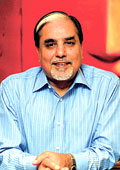 |
| Zee’s Chandra: India’s Kerry
Packer? |
In
1977, Kerry Packer hit upon an innovative approach to revive the
languishing ratings of his Australian television station, Channel
Nine. He launched World Series Cricket (WSC), a breakaway professional
cricket competition that took on the established format of the
game by luring 50 of the best international cricketers with lip-smacking
pay-packets. The concept took its time to click, but by the time
the second season began, Packer's unique day-night one-day matches-played
under floodlights, with teams in coloured clothing-began to gain
in popularity. Sections of the media dubbed the series "Packer's
Circus", but looking back he was responsible for taking the
game to a new level-microphones in stumps, helmets, cameras at
both ends of the pitch and a variety of camera angles, much of
which is taken for granted today, were a function of WSC.
Now, 25 years on, Subhash Chandra, the pioneering founder of
the Essel Group, which broadcasts the Zee bouquet of channels,
appears to be trying something similar. Last fortnight, he announced
the launch of a parallel cricket series, dubbed the "India
Cricket League" (ICL), in association with financial institution
IL&Fs. Ostensibly aimed at improving the quality of cricket
talent in India, ICL will be set up with an investment of Rs 100
crore and will be the richest professional cricket league in India
with an annual prize money of $1 million (Rs 4.3 crore). The amount
by itself may not appear mouthwatering-after all Indian one-day
cricketers will be paid Rs 1 lakh per match (after a recent revision)-but
what works in Chandra's favour is the timing of the announcement;
it comes as it is in the wake of India's debacle at the ICC World
Cup, and the fans' disillusionment with the team, the game and
the Board of Control for Cricket in India (BCCI).
The format? The league will initially comprise six teams, which
will be expanded to 16 after three years. According to Chandra:
"A professional league is the need of the hour, as is a killer
instinct. Budding talent must be groomed at the grassroot levels
and given the experience to play on competitive pitches and not
on placid tracks which is usually their downfall when tested on
international circuits." ICL will have 50-over one-dayers
as well as 20:20 format games. Each team will also have first
and second division sides so as to maximise talent utilisation.
So, is the ICL another WSC in the making? Not quite, if you
go by what Harish Thawani, | 


